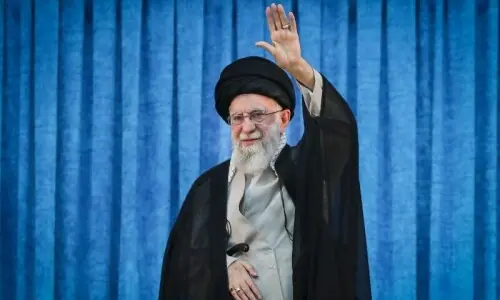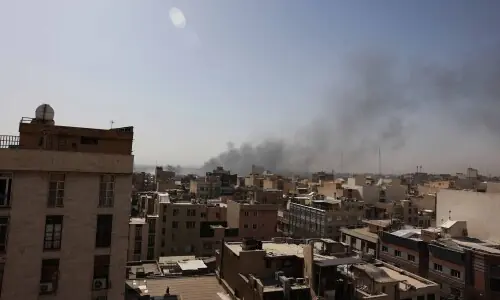RIYADH: Drone attacks claimed by Iran-aligned Yemen rebels shut down one of Saudi Arabia’s major oil pipelines on Tuesday, further ratcheting up Gulf tensions after the mysterious sabotage of several tankers.
Days after the United States deployed bombers and an assault ship to bolster an aircraft carrier in the region, the world’s largest crude exporter said two pumping stations had been targeted early Tuesday.
They lie on the East West Pipeline, able to pump five million barrels of oil a day from the oil-rich eastern province to a Red Sea export terminal.

The announcement came hours after Yemen’s Houthi rebels said they had targeted vital installations in Saudi Arabia, which leads a military coalition against them.
Stations reportedly targeted are situated west of Riyadh; energy minister says oil production and exports have not been interrupted
Energy Minister Khalid al-Falih said Saudi Aramco had “temporarily shut down” the pipeline to “evaluate its condition” but added that oil production and exports had not been interrupted.
“The company [Saudi Aramco] is working on restoring the pumping station before resuming operations,” he said in a statement carried by the official Saudi Press Agency.
The stations reportedly targeted lie west of Riyadh, at Dawadmi and Afeef.
Minister Falih said Tuesday’s incident was an “act of terrorism ... that not only targets the kingdom but also the security of oil supplies to the world and the global economy”.
Houthi spokesman Mohammed Abdulsalam wrote on Twitter that the attacks were “a response to the aggressors continuing to commit genocide” against the Yemeni people.
In a statement carried by the rebel-run Al-Masirah TV, the Houthis warned of other “unique operations ... if the aggressors continue with their crimes and blockade”. “We are capable of executing unique operations on a bigger and wider scale in the hearts of the enemy countries,” they said.
Saudi Arabia and the United Arab Emirates intervened in the Yemen war to bolster the internationally-recognised government’s efforts against the Houthis in March 2015.
The 1,200-kilometre pipeline reportedly hit on Tuesday serves as an alternative for Saudi crude exports if the strategically vital Strait of Hormuz at the mouth of the Gulf were to be closed.
Iran has repeatedly threatened to close the strait in case of a military confrontation with the US.
The reported pipeline attacks came after the UAE said four ships were damaged in “sabotage attacks” off the emirate of Fujairah, close to the Hormuz, on Sunday.
Washington and its Gulf allies stopped short of blaming Riyadh’s arch-rival Tehran for the sabotage, but US President Donald Trump warned Iran against doing anything to harm US interests. “If they [Iran] do anything, it would be a very bad mistake,” Trump warned at the White House.
Iranian President Hassan Rouhani hit back, saying the Islamic republic was “too great to be intimidated by anyone”.
The attacks came after the United States deployed the USS Abraham Lincoln carrier group, an amphibious assault vessel, a Patriot missile battery and B-52 bombers, triggering fears of a possible military confrontation.
A UAE government official said the Saudi oil tankers Al-Marzoqah and Amjad were attacked off the emirate of Fujairah along with the Norwegian tanker Andrea Victory and an Emirati ship, the A. Michel. No casualties were reported and none of the vessels sank.
The UAE minister of state for foreign affairs, Anwar Gargash, said the Emirates will probe the “deliberate sabotage”.
Saudi Arabia said its two tankers suffered “significant damage” but there was no oil spill.
Asked whether the US believed Iran played a role in the attacks, Washington’s Iran envoy Brian Hook declined to comment, saying only that US authorities would help the investigation at the request of the UAE.
Published in Dawn, May 15th, 2019
































